SIT60316 Advanced Diploma: Manage Meetings Assessment - Task 1 & 2
VerifiedAdded on 2023/06/07
|17
|5639
|107
Homework Assignment
AI Summary
This document presents a comprehensive solution for the SIT60316 Advanced Diploma of Hospitality Management unit BSBADM502, focusing on managing meetings. The assignment is divided into two main tasks: Task 1 involves answering short answer questions related to effective agenda setting, meeting styles, roles within a meeting (chairperson, secretary, participants), legal considerations, and problem-solving techniques. The questions cover various aspects of meeting management, including planning, preparation, and execution. Task 2 is a role-play assessment, requiring planning, conducting, and following up on a management meeting. It includes preparing an agenda, conducting the meeting, and documenting the outcomes. The solution demonstrates understanding of key concepts such as setting objectives, managing time, facilitating discussion, and ensuring effective communication. The document provides detailed answers and practical examples, covering all aspects of the assessment criteria to demonstrate competency in managing meetings effectively.
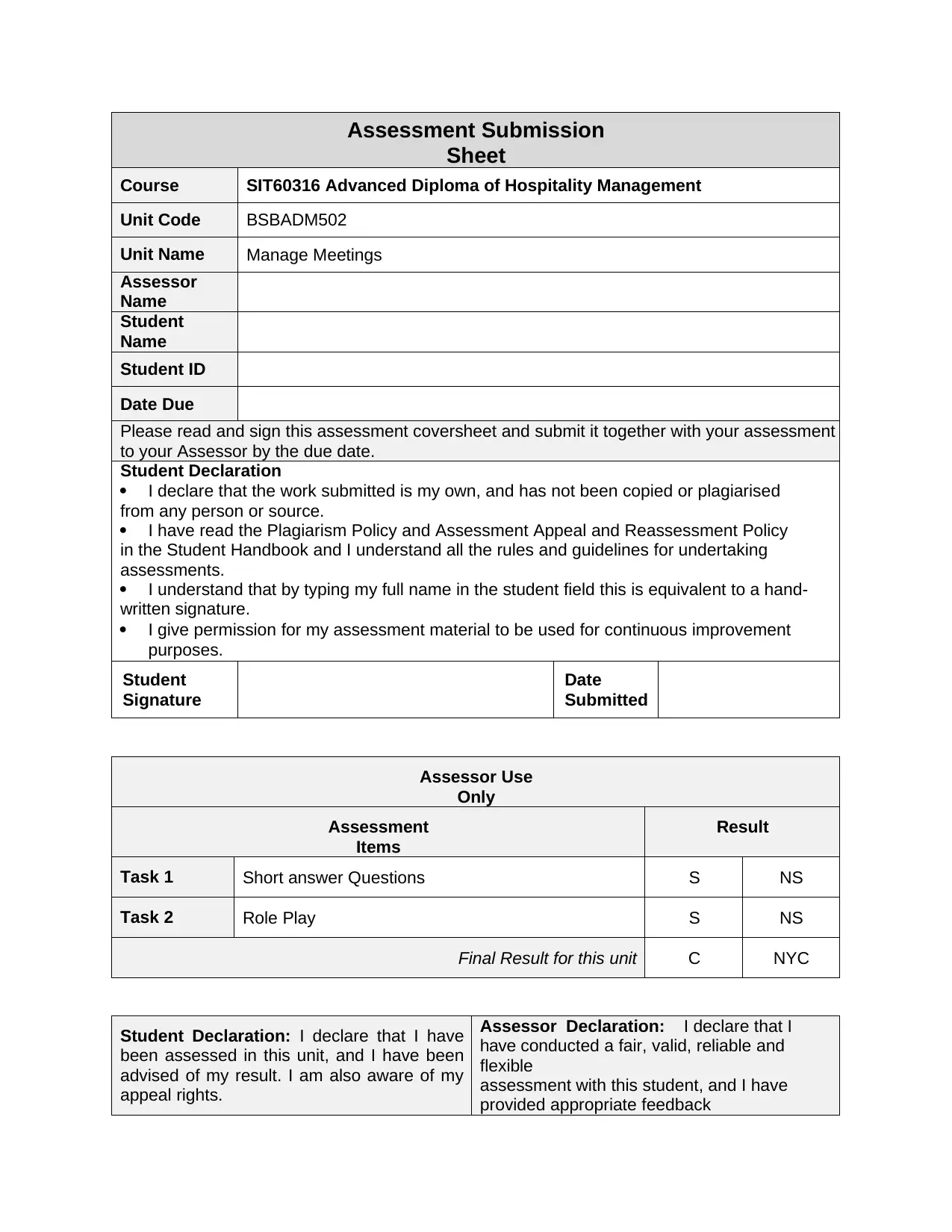
Assessment Submission
Sheet
Course SIT60316 Advanced Diploma of Hospitality Management
Unit Code BSBADM502
Unit Name Manage Meetings
Assessor
Name
Student
Name
Student ID
Date Due
Please read and sign this assessment coversheet and submit it together with your assessment
to your Assessor by the due date.
Student Declaration
I declare that the work submitted is my own, and has not been copied or plagiarised
from any person or source.
I have read the Plagiarism Policy and Assessment Appeal and Reassessment Policy
in the Student Handbook and I understand all the rules and guidelines for undertaking
assessments.
I understand that by typing my full name in the student field this is equivalent to a hand-
written signature.
I give permission for my assessment material to be used for continuous improvement
purposes.
Student
Signature
Date
Submitted
Assessor Use
Only
Assessment
Items
Result
Task 1 Short answer Questions S NS
Task 2 Role Play S NS
Final Result for this unit C NYC
Student Declaration: I declare that I have
been assessed in this unit, and I have been
advised of my result. I am also aware of my
appeal rights.
Assessor Declaration: I declare that I
have conducted a fair, valid, reliable and
flexible
assessment with this student, and I have
provided appropriate feedback
Sheet
Course SIT60316 Advanced Diploma of Hospitality Management
Unit Code BSBADM502
Unit Name Manage Meetings
Assessor
Name
Student
Name
Student ID
Date Due
Please read and sign this assessment coversheet and submit it together with your assessment
to your Assessor by the due date.
Student Declaration
I declare that the work submitted is my own, and has not been copied or plagiarised
from any person or source.
I have read the Plagiarism Policy and Assessment Appeal and Reassessment Policy
in the Student Handbook and I understand all the rules and guidelines for undertaking
assessments.
I understand that by typing my full name in the student field this is equivalent to a hand-
written signature.
I give permission for my assessment material to be used for continuous improvement
purposes.
Student
Signature
Date
Submitted
Assessor Use
Only
Assessment
Items
Result
Task 1 Short answer Questions S NS
Task 2 Role Play S NS
Final Result for this unit C NYC
Student Declaration: I declare that I have
been assessed in this unit, and I have been
advised of my result. I am also aware of my
appeal rights.
Assessor Declaration: I declare that I
have conducted a fair, valid, reliable and
flexible
assessment with this student, and I have
provided appropriate feedback
Paraphrase This Document
Need a fresh take? Get an instant paraphrase of this document with our AI Paraphraser
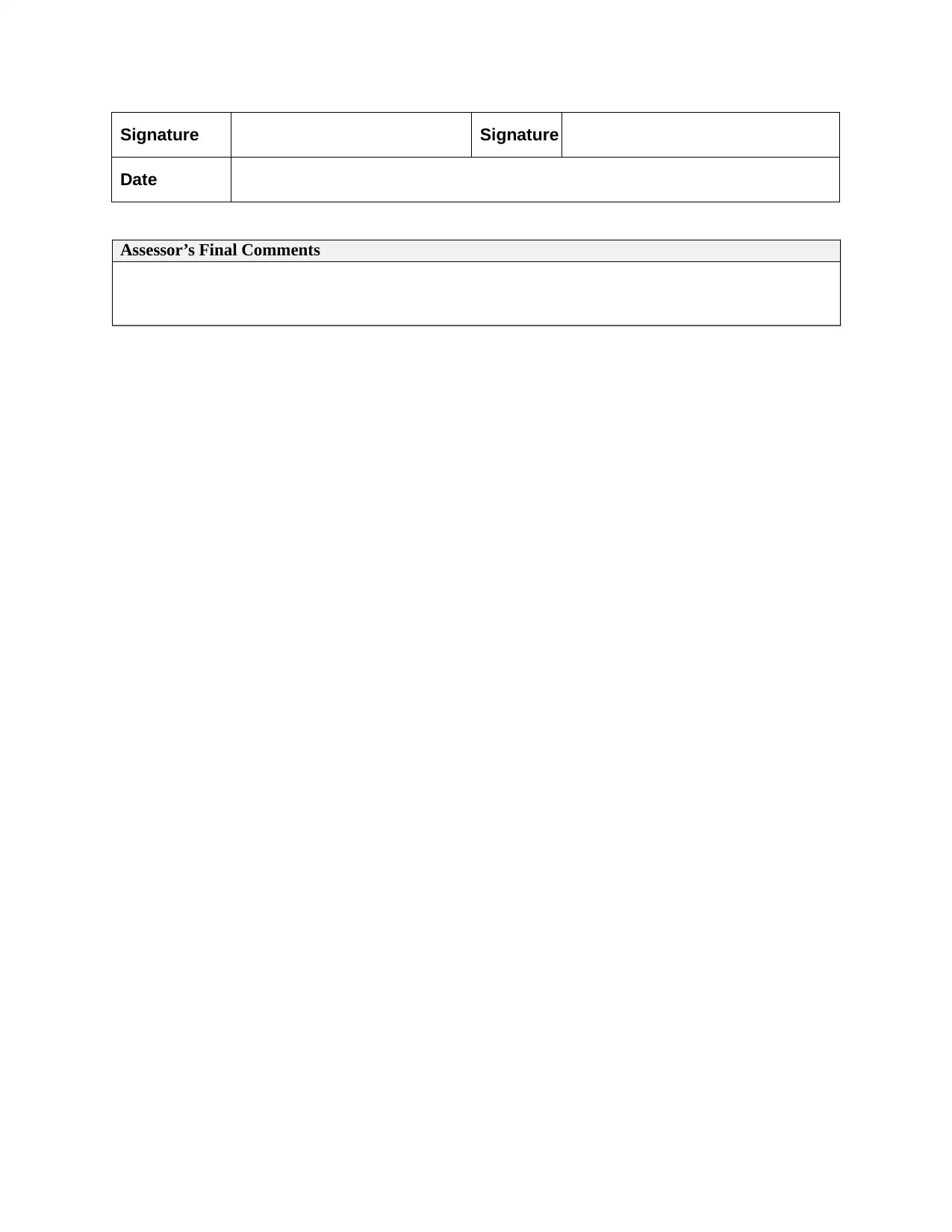
Signature Signature
Date
Assessor’s Final Comments
Date
Assessor’s Final Comments
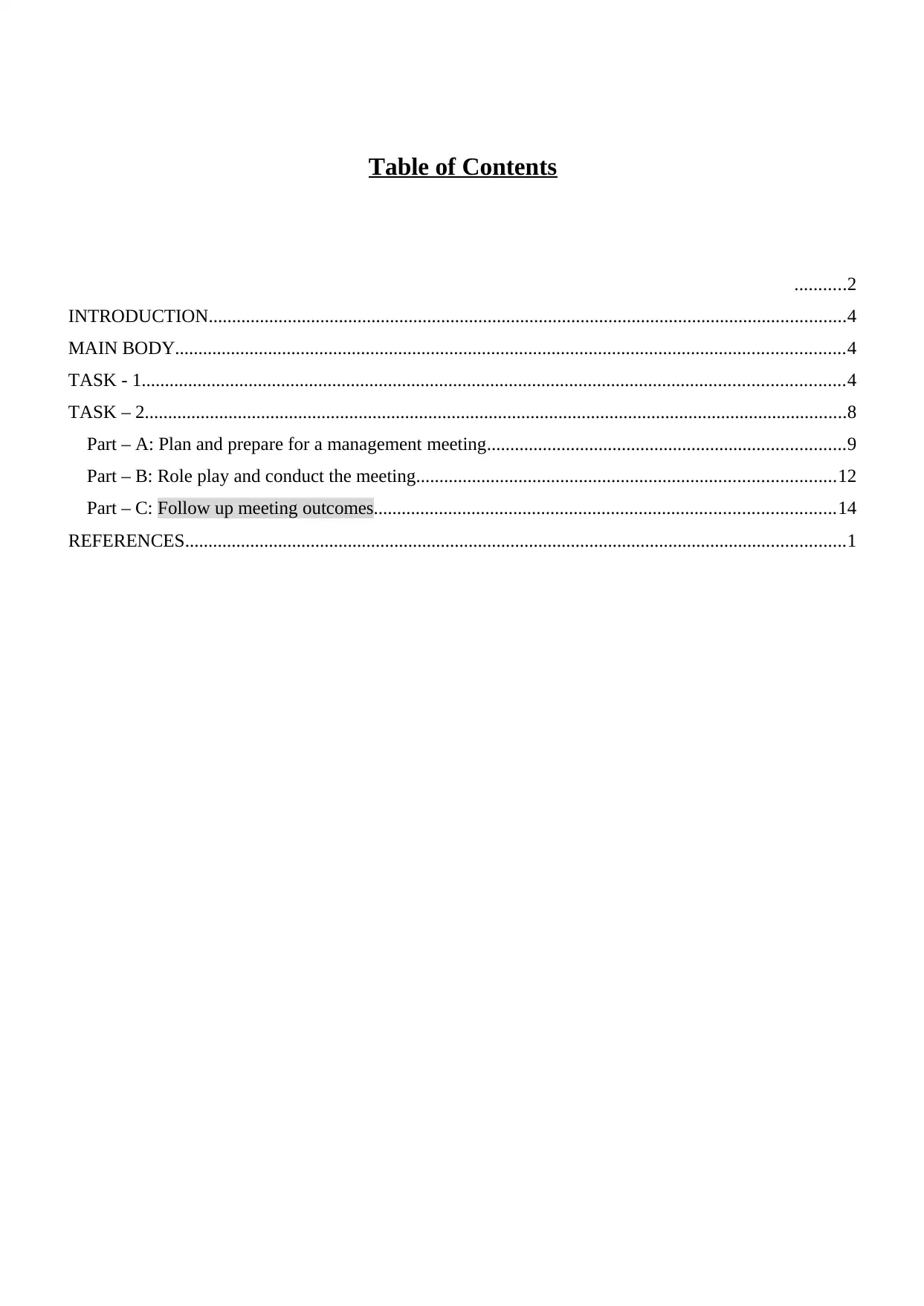
Table of Contents
...........2
INTRODUCTION.........................................................................................................................................4
MAIN BODY................................................................................................................................................4
TASK - 1.......................................................................................................................................................4
TASK – 2.......................................................................................................................................................8
Part – A: Plan and prepare for a management meeting.............................................................................9
Part – B: Role play and conduct the meeting..........................................................................................12
Part – C: Follow up meeting outcomes...................................................................................................14
REFERENCES..............................................................................................................................................1
...........2
INTRODUCTION.........................................................................................................................................4
MAIN BODY................................................................................................................................................4
TASK - 1.......................................................................................................................................................4
TASK – 2.......................................................................................................................................................8
Part – A: Plan and prepare for a management meeting.............................................................................9
Part – B: Role play and conduct the meeting..........................................................................................12
Part – C: Follow up meeting outcomes...................................................................................................14
REFERENCES..............................................................................................................................................1
⊘ This is a preview!⊘
Do you want full access?
Subscribe today to unlock all pages.

Trusted by 1+ million students worldwide
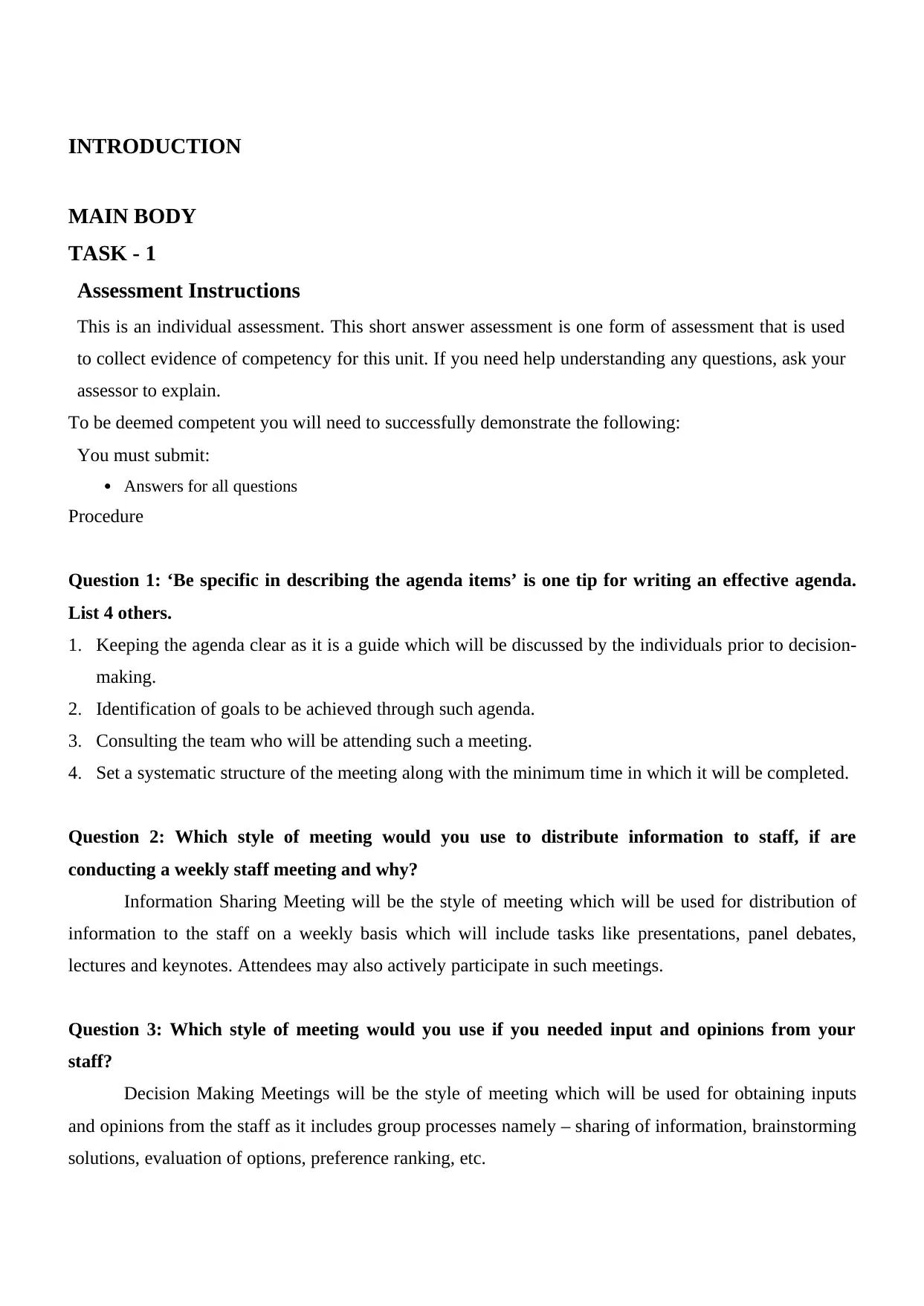
INTRODUCTION
MAIN BODY
TASK - 1
Assessment Instructions
This is an individual assessment. This short answer assessment is one form of assessment that is used
to collect evidence of competency for this unit. If you need help understanding any questions, ask your
assessor to explain.
To be deemed competent you will need to successfully demonstrate the following:
You must submit:
Answers for all questions
Procedure
Question 1: ‘Be specific in describing the agenda items’ is one tip for writing an effective agenda.
List 4 others.
1. Keeping the agenda clear as it is a guide which will be discussed by the individuals prior to decision-
making.
2. Identification of goals to be achieved through such agenda.
3. Consulting the team who will be attending such a meeting.
4. Set a systematic structure of the meeting along with the minimum time in which it will be completed.
Question 2: Which style of meeting would you use to distribute information to staff, if are
conducting a weekly staff meeting and why?
Information Sharing Meeting will be the style of meeting which will be used for distribution of
information to the staff on a weekly basis which will include tasks like presentations, panel debates,
lectures and keynotes. Attendees may also actively participate in such meetings.
Question 3: Which style of meeting would you use if you needed input and opinions from your
staff?
Decision Making Meetings will be the style of meeting which will be used for obtaining inputs
and opinions from the staff as it includes group processes namely – sharing of information, brainstorming
solutions, evaluation of options, preference ranking, etc.
MAIN BODY
TASK - 1
Assessment Instructions
This is an individual assessment. This short answer assessment is one form of assessment that is used
to collect evidence of competency for this unit. If you need help understanding any questions, ask your
assessor to explain.
To be deemed competent you will need to successfully demonstrate the following:
You must submit:
Answers for all questions
Procedure
Question 1: ‘Be specific in describing the agenda items’ is one tip for writing an effective agenda.
List 4 others.
1. Keeping the agenda clear as it is a guide which will be discussed by the individuals prior to decision-
making.
2. Identification of goals to be achieved through such agenda.
3. Consulting the team who will be attending such a meeting.
4. Set a systematic structure of the meeting along with the minimum time in which it will be completed.
Question 2: Which style of meeting would you use to distribute information to staff, if are
conducting a weekly staff meeting and why?
Information Sharing Meeting will be the style of meeting which will be used for distribution of
information to the staff on a weekly basis which will include tasks like presentations, panel debates,
lectures and keynotes. Attendees may also actively participate in such meetings.
Question 3: Which style of meeting would you use if you needed input and opinions from your
staff?
Decision Making Meetings will be the style of meeting which will be used for obtaining inputs
and opinions from the staff as it includes group processes namely – sharing of information, brainstorming
solutions, evaluation of options, preference ranking, etc.
Paraphrase This Document
Need a fresh take? Get an instant paraphrase of this document with our AI Paraphraser
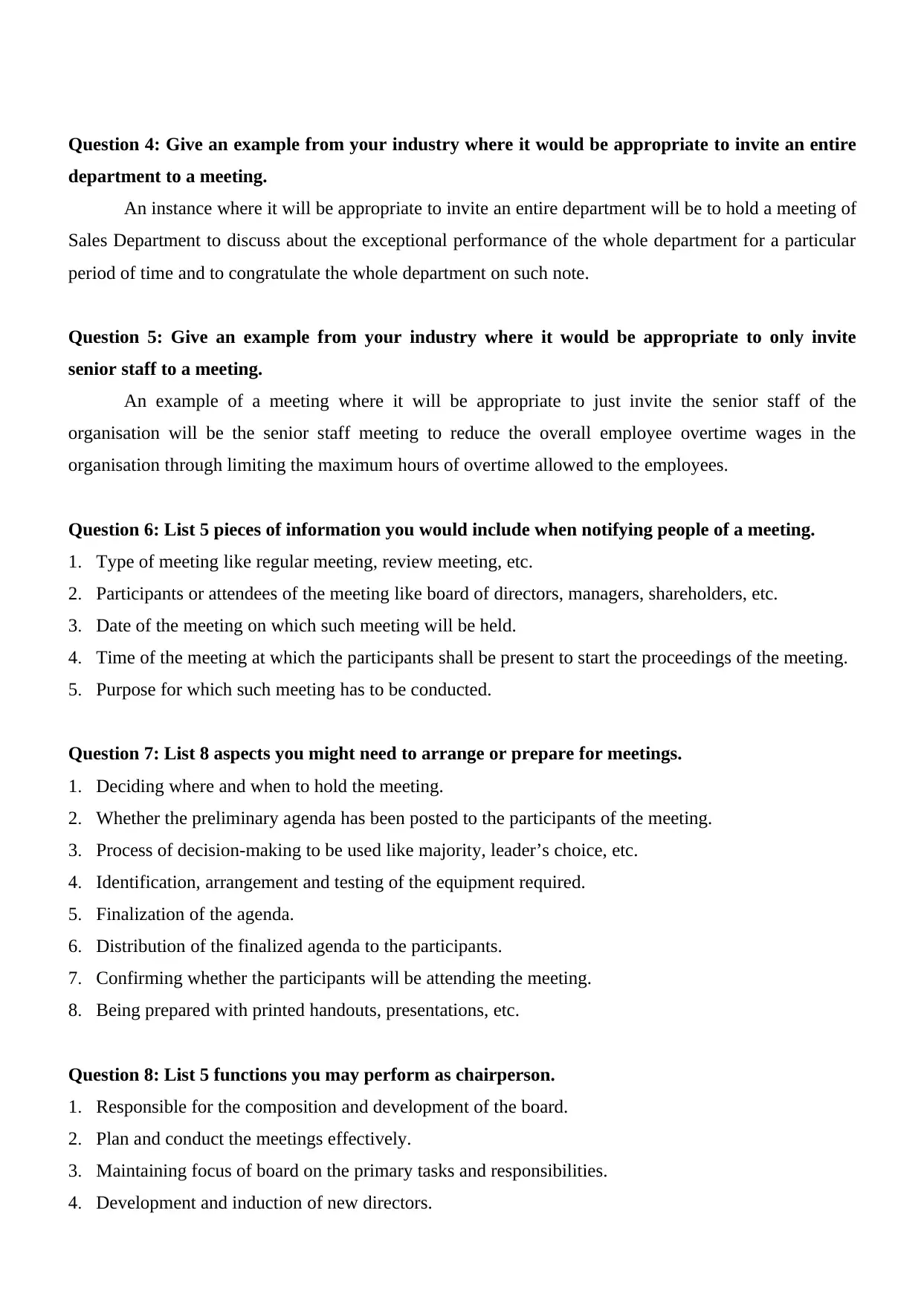
Question 4: Give an example from your industry where it would be appropriate to invite an entire
department to a meeting.
An instance where it will be appropriate to invite an entire department will be to hold a meeting of
Sales Department to discuss about the exceptional performance of the whole department for a particular
period of time and to congratulate the whole department on such note.
Question 5: Give an example from your industry where it would be appropriate to only invite
senior staff to a meeting.
An example of a meeting where it will be appropriate to just invite the senior staff of the
organisation will be the senior staff meeting to reduce the overall employee overtime wages in the
organisation through limiting the maximum hours of overtime allowed to the employees.
Question 6: List 5 pieces of information you would include when notifying people of a meeting.
1. Type of meeting like regular meeting, review meeting, etc.
2. Participants or attendees of the meeting like board of directors, managers, shareholders, etc.
3. Date of the meeting on which such meeting will be held.
4. Time of the meeting at which the participants shall be present to start the proceedings of the meeting.
5. Purpose for which such meeting has to be conducted.
Question 7: List 8 aspects you might need to arrange or prepare for meetings.
1. Deciding where and when to hold the meeting.
2. Whether the preliminary agenda has been posted to the participants of the meeting.
3. Process of decision-making to be used like majority, leader’s choice, etc.
4. Identification, arrangement and testing of the equipment required.
5. Finalization of the agenda.
6. Distribution of the finalized agenda to the participants.
7. Confirming whether the participants will be attending the meeting.
8. Being prepared with printed handouts, presentations, etc.
Question 8: List 5 functions you may perform as chairperson.
1. Responsible for the composition and development of the board.
2. Plan and conduct the meetings effectively.
3. Maintaining focus of board on the primary tasks and responsibilities.
4. Development and induction of new directors.
department to a meeting.
An instance where it will be appropriate to invite an entire department will be to hold a meeting of
Sales Department to discuss about the exceptional performance of the whole department for a particular
period of time and to congratulate the whole department on such note.
Question 5: Give an example from your industry where it would be appropriate to only invite
senior staff to a meeting.
An example of a meeting where it will be appropriate to just invite the senior staff of the
organisation will be the senior staff meeting to reduce the overall employee overtime wages in the
organisation through limiting the maximum hours of overtime allowed to the employees.
Question 6: List 5 pieces of information you would include when notifying people of a meeting.
1. Type of meeting like regular meeting, review meeting, etc.
2. Participants or attendees of the meeting like board of directors, managers, shareholders, etc.
3. Date of the meeting on which such meeting will be held.
4. Time of the meeting at which the participants shall be present to start the proceedings of the meeting.
5. Purpose for which such meeting has to be conducted.
Question 7: List 8 aspects you might need to arrange or prepare for meetings.
1. Deciding where and when to hold the meeting.
2. Whether the preliminary agenda has been posted to the participants of the meeting.
3. Process of decision-making to be used like majority, leader’s choice, etc.
4. Identification, arrangement and testing of the equipment required.
5. Finalization of the agenda.
6. Distribution of the finalized agenda to the participants.
7. Confirming whether the participants will be attending the meeting.
8. Being prepared with printed handouts, presentations, etc.
Question 8: List 5 functions you may perform as chairperson.
1. Responsible for the composition and development of the board.
2. Plan and conduct the meetings effectively.
3. Maintaining focus of board on the primary tasks and responsibilities.
4. Development and induction of new directors.
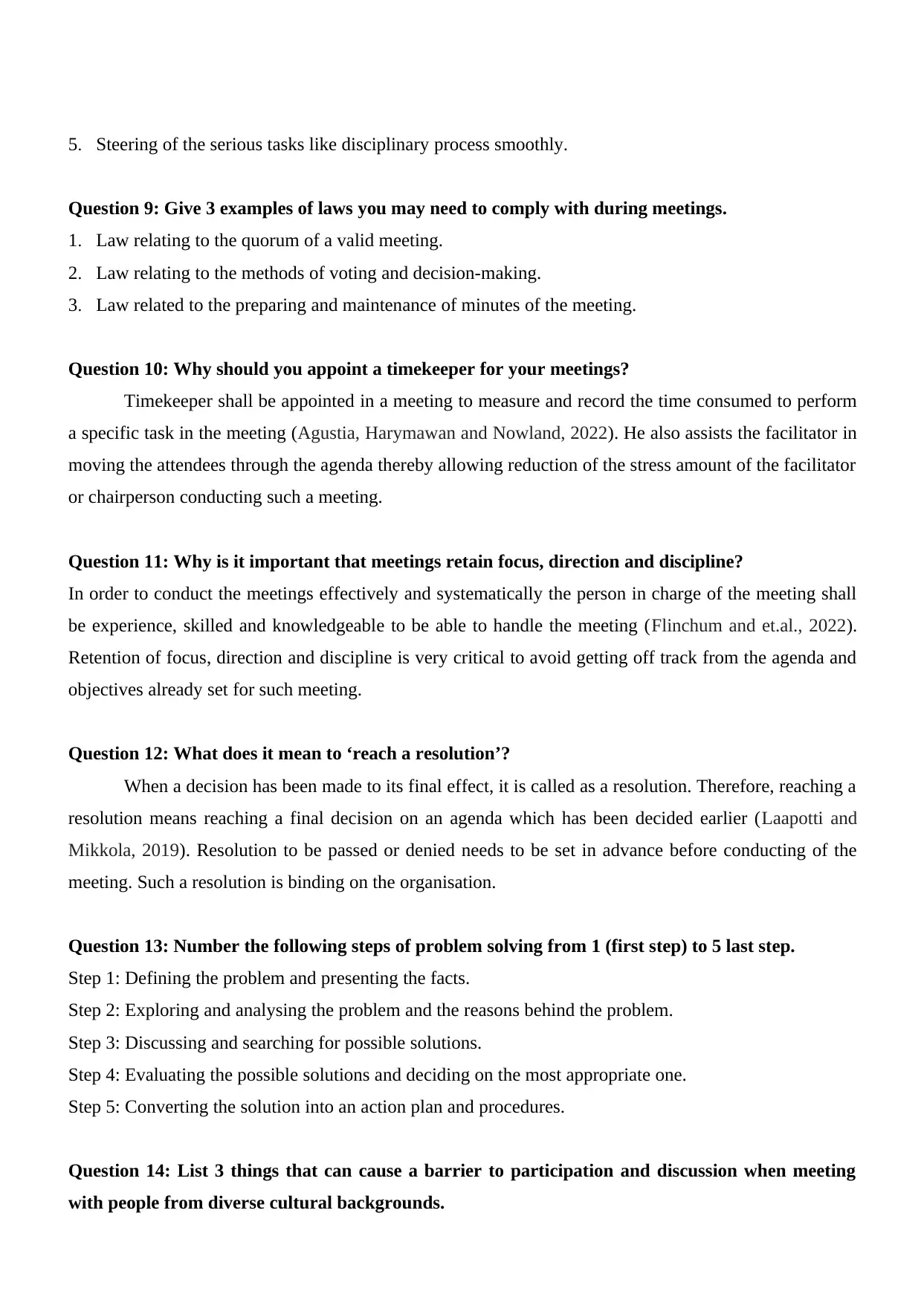
5. Steering of the serious tasks like disciplinary process smoothly.
Question 9: Give 3 examples of laws you may need to comply with during meetings.
1. Law relating to the quorum of a valid meeting.
2. Law relating to the methods of voting and decision-making.
3. Law related to the preparing and maintenance of minutes of the meeting.
Question 10: Why should you appoint a timekeeper for your meetings?
Timekeeper shall be appointed in a meeting to measure and record the time consumed to perform
a specific task in the meeting (Agustia, Harymawan and Nowland, 2022). He also assists the facilitator in
moving the attendees through the agenda thereby allowing reduction of the stress amount of the facilitator
or chairperson conducting such a meeting.
Question 11: Why is it important that meetings retain focus, direction and discipline?
In order to conduct the meetings effectively and systematically the person in charge of the meeting shall
be experience, skilled and knowledgeable to be able to handle the meeting (Flinchum and et.al., 2022).
Retention of focus, direction and discipline is very critical to avoid getting off track from the agenda and
objectives already set for such meeting.
Question 12: What does it mean to ‘reach a resolution’?
When a decision has been made to its final effect, it is called as a resolution. Therefore, reaching a
resolution means reaching a final decision on an agenda which has been decided earlier (Laapotti and
Mikkola, 2019). Resolution to be passed or denied needs to be set in advance before conducting of the
meeting. Such a resolution is binding on the organisation.
Question 13: Number the following steps of problem solving from 1 (first step) to 5 last step.
Step 1: Defining the problem and presenting the facts.
Step 2: Exploring and analysing the problem and the reasons behind the problem.
Step 3: Discussing and searching for possible solutions.
Step 4: Evaluating the possible solutions and deciding on the most appropriate one.
Step 5: Converting the solution into an action plan and procedures.
Question 14: List 3 things that can cause a barrier to participation and discussion when meeting
with people from diverse cultural backgrounds.
Question 9: Give 3 examples of laws you may need to comply with during meetings.
1. Law relating to the quorum of a valid meeting.
2. Law relating to the methods of voting and decision-making.
3. Law related to the preparing and maintenance of minutes of the meeting.
Question 10: Why should you appoint a timekeeper for your meetings?
Timekeeper shall be appointed in a meeting to measure and record the time consumed to perform
a specific task in the meeting (Agustia, Harymawan and Nowland, 2022). He also assists the facilitator in
moving the attendees through the agenda thereby allowing reduction of the stress amount of the facilitator
or chairperson conducting such a meeting.
Question 11: Why is it important that meetings retain focus, direction and discipline?
In order to conduct the meetings effectively and systematically the person in charge of the meeting shall
be experience, skilled and knowledgeable to be able to handle the meeting (Flinchum and et.al., 2022).
Retention of focus, direction and discipline is very critical to avoid getting off track from the agenda and
objectives already set for such meeting.
Question 12: What does it mean to ‘reach a resolution’?
When a decision has been made to its final effect, it is called as a resolution. Therefore, reaching a
resolution means reaching a final decision on an agenda which has been decided earlier (Laapotti and
Mikkola, 2019). Resolution to be passed or denied needs to be set in advance before conducting of the
meeting. Such a resolution is binding on the organisation.
Question 13: Number the following steps of problem solving from 1 (first step) to 5 last step.
Step 1: Defining the problem and presenting the facts.
Step 2: Exploring and analysing the problem and the reasons behind the problem.
Step 3: Discussing and searching for possible solutions.
Step 4: Evaluating the possible solutions and deciding on the most appropriate one.
Step 5: Converting the solution into an action plan and procedures.
Question 14: List 3 things that can cause a barrier to participation and discussion when meeting
with people from diverse cultural backgrounds.
⊘ This is a preview!⊘
Do you want full access?
Subscribe today to unlock all pages.

Trusted by 1+ million students worldwide
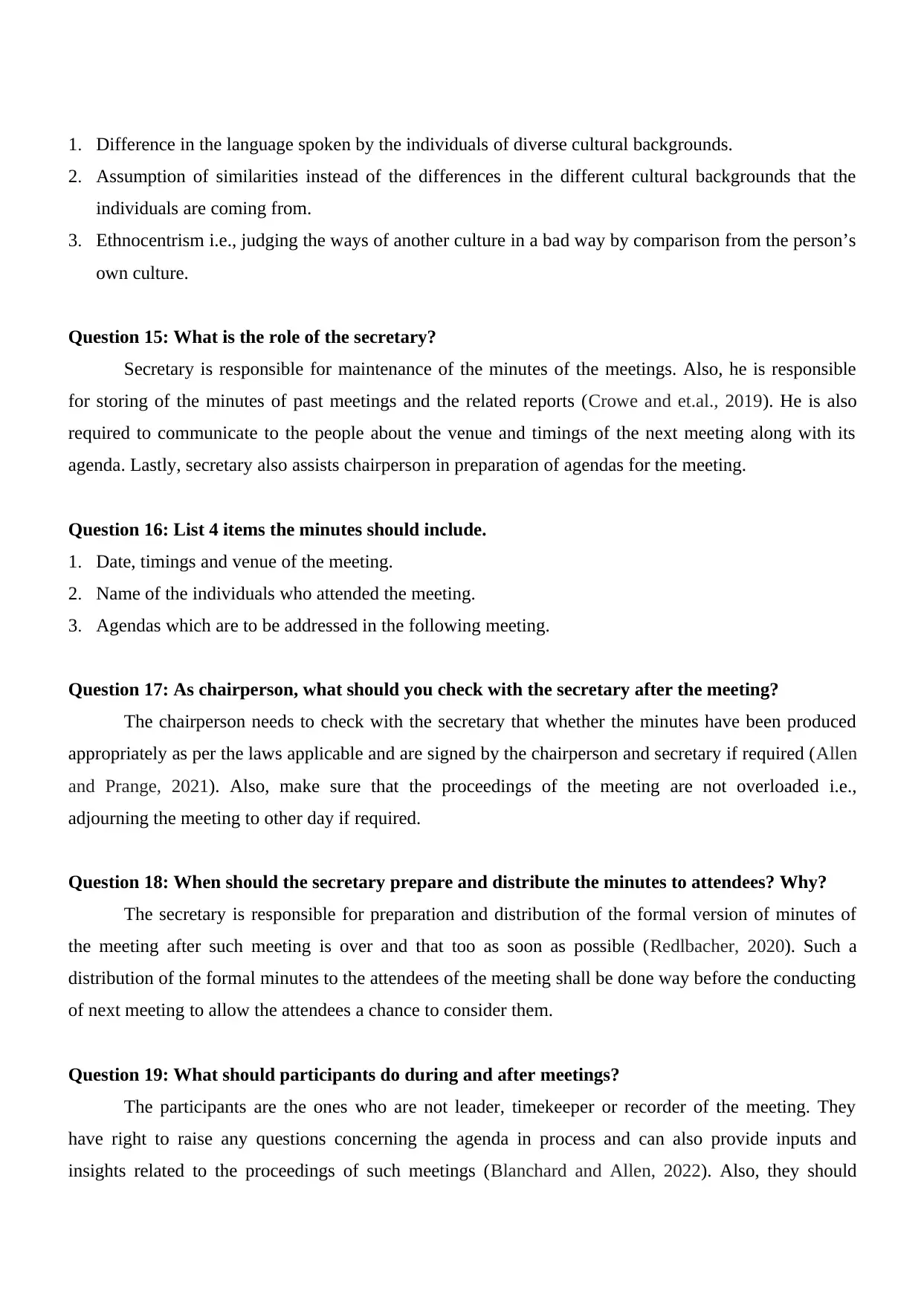
1. Difference in the language spoken by the individuals of diverse cultural backgrounds.
2. Assumption of similarities instead of the differences in the different cultural backgrounds that the
individuals are coming from.
3. Ethnocentrism i.e., judging the ways of another culture in a bad way by comparison from the person’s
own culture.
Question 15: What is the role of the secretary?
Secretary is responsible for maintenance of the minutes of the meetings. Also, he is responsible
for storing of the minutes of past meetings and the related reports (Crowe and et.al., 2019). He is also
required to communicate to the people about the venue and timings of the next meeting along with its
agenda. Lastly, secretary also assists chairperson in preparation of agendas for the meeting.
Question 16: List 4 items the minutes should include.
1. Date, timings and venue of the meeting.
2. Name of the individuals who attended the meeting.
3. Agendas which are to be addressed in the following meeting.
Question 17: As chairperson, what should you check with the secretary after the meeting?
The chairperson needs to check with the secretary that whether the minutes have been produced
appropriately as per the laws applicable and are signed by the chairperson and secretary if required (Allen
and Prange, 2021). Also, make sure that the proceedings of the meeting are not overloaded i.e.,
adjourning the meeting to other day if required.
Question 18: When should the secretary prepare and distribute the minutes to attendees? Why?
The secretary is responsible for preparation and distribution of the formal version of minutes of
the meeting after such meeting is over and that too as soon as possible (Redlbacher, 2020). Such a
distribution of the formal minutes to the attendees of the meeting shall be done way before the conducting
of next meeting to allow the attendees a chance to consider them.
Question 19: What should participants do during and after meetings?
The participants are the ones who are not leader, timekeeper or recorder of the meeting. They
have right to raise any questions concerning the agenda in process and can also provide inputs and
insights related to the proceedings of such meetings (Blanchard and Allen, 2022). Also, they should
2. Assumption of similarities instead of the differences in the different cultural backgrounds that the
individuals are coming from.
3. Ethnocentrism i.e., judging the ways of another culture in a bad way by comparison from the person’s
own culture.
Question 15: What is the role of the secretary?
Secretary is responsible for maintenance of the minutes of the meetings. Also, he is responsible
for storing of the minutes of past meetings and the related reports (Crowe and et.al., 2019). He is also
required to communicate to the people about the venue and timings of the next meeting along with its
agenda. Lastly, secretary also assists chairperson in preparation of agendas for the meeting.
Question 16: List 4 items the minutes should include.
1. Date, timings and venue of the meeting.
2. Name of the individuals who attended the meeting.
3. Agendas which are to be addressed in the following meeting.
Question 17: As chairperson, what should you check with the secretary after the meeting?
The chairperson needs to check with the secretary that whether the minutes have been produced
appropriately as per the laws applicable and are signed by the chairperson and secretary if required (Allen
and Prange, 2021). Also, make sure that the proceedings of the meeting are not overloaded i.e.,
adjourning the meeting to other day if required.
Question 18: When should the secretary prepare and distribute the minutes to attendees? Why?
The secretary is responsible for preparation and distribution of the formal version of minutes of
the meeting after such meeting is over and that too as soon as possible (Redlbacher, 2020). Such a
distribution of the formal minutes to the attendees of the meeting shall be done way before the conducting
of next meeting to allow the attendees a chance to consider them.
Question 19: What should participants do during and after meetings?
The participants are the ones who are not leader, timekeeper or recorder of the meeting. They
have right to raise any questions concerning the agenda in process and can also provide inputs and
insights related to the proceedings of such meetings (Blanchard and Allen, 2022). Also, they should
Paraphrase This Document
Need a fresh take? Get an instant paraphrase of this document with our AI Paraphraser
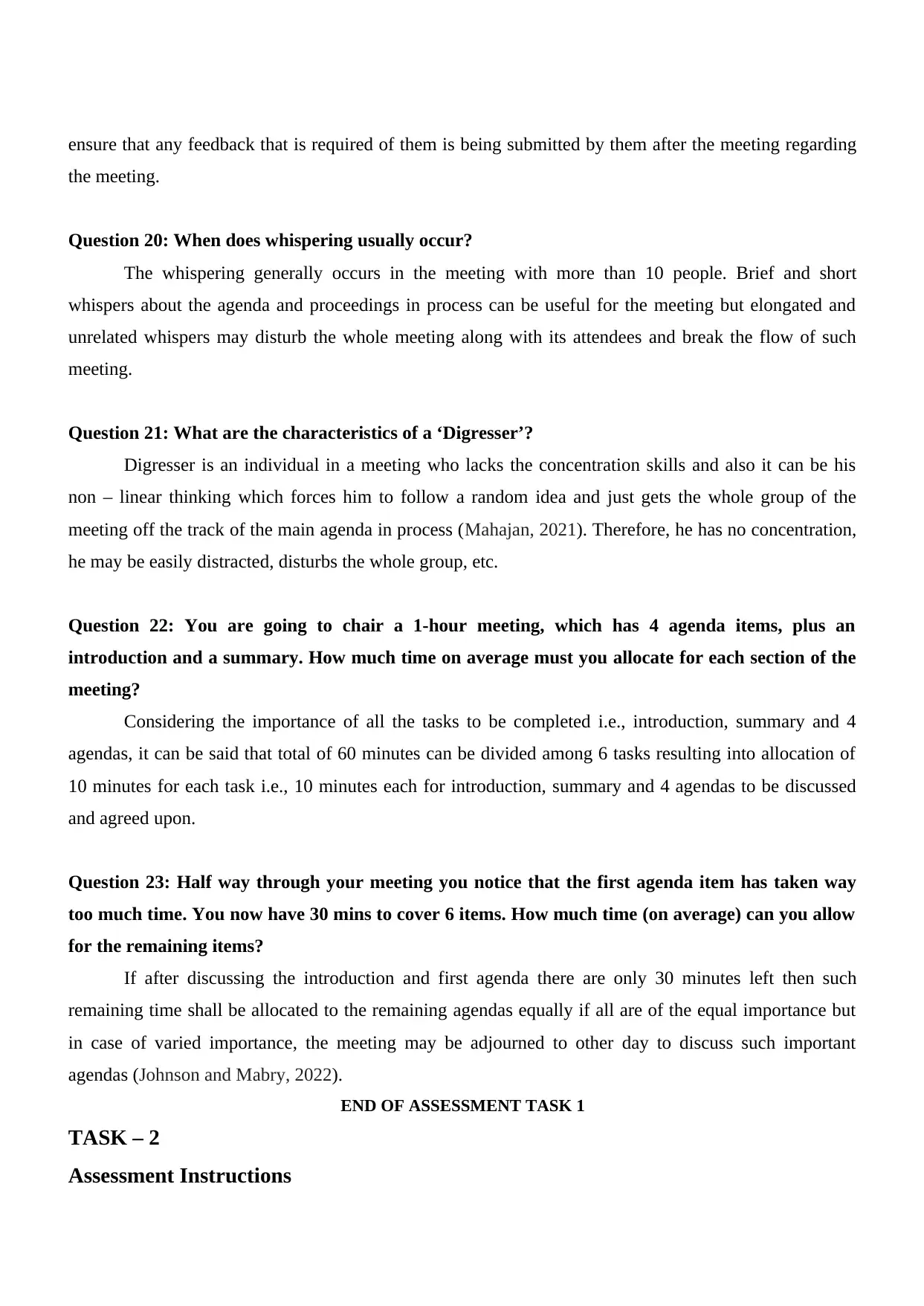
ensure that any feedback that is required of them is being submitted by them after the meeting regarding
the meeting.
Question 20: When does whispering usually occur?
The whispering generally occurs in the meeting with more than 10 people. Brief and short
whispers about the agenda and proceedings in process can be useful for the meeting but elongated and
unrelated whispers may disturb the whole meeting along with its attendees and break the flow of such
meeting.
Question 21: What are the characteristics of a ‘Digresser’?
Digresser is an individual in a meeting who lacks the concentration skills and also it can be his
non – linear thinking which forces him to follow a random idea and just gets the whole group of the
meeting off the track of the main agenda in process (Mahajan, 2021). Therefore, he has no concentration,
he may be easily distracted, disturbs the whole group, etc.
Question 22: You are going to chair a 1-hour meeting, which has 4 agenda items, plus an
introduction and a summary. How much time on average must you allocate for each section of the
meeting?
Considering the importance of all the tasks to be completed i.e., introduction, summary and 4
agendas, it can be said that total of 60 minutes can be divided among 6 tasks resulting into allocation of
10 minutes for each task i.e., 10 minutes each for introduction, summary and 4 agendas to be discussed
and agreed upon.
Question 23: Half way through your meeting you notice that the first agenda item has taken way
too much time. You now have 30 mins to cover 6 items. How much time (on average) can you allow
for the remaining items?
If after discussing the introduction and first agenda there are only 30 minutes left then such
remaining time shall be allocated to the remaining agendas equally if all are of the equal importance but
in case of varied importance, the meeting may be adjourned to other day to discuss such important
agendas (Johnson and Mabry, 2022).
END OF ASSESSMENT TASK 1
TASK – 2
Assessment Instructions
the meeting.
Question 20: When does whispering usually occur?
The whispering generally occurs in the meeting with more than 10 people. Brief and short
whispers about the agenda and proceedings in process can be useful for the meeting but elongated and
unrelated whispers may disturb the whole meeting along with its attendees and break the flow of such
meeting.
Question 21: What are the characteristics of a ‘Digresser’?
Digresser is an individual in a meeting who lacks the concentration skills and also it can be his
non – linear thinking which forces him to follow a random idea and just gets the whole group of the
meeting off the track of the main agenda in process (Mahajan, 2021). Therefore, he has no concentration,
he may be easily distracted, disturbs the whole group, etc.
Question 22: You are going to chair a 1-hour meeting, which has 4 agenda items, plus an
introduction and a summary. How much time on average must you allocate for each section of the
meeting?
Considering the importance of all the tasks to be completed i.e., introduction, summary and 4
agendas, it can be said that total of 60 minutes can be divided among 6 tasks resulting into allocation of
10 minutes for each task i.e., 10 minutes each for introduction, summary and 4 agendas to be discussed
and agreed upon.
Question 23: Half way through your meeting you notice that the first agenda item has taken way
too much time. You now have 30 mins to cover 6 items. How much time (on average) can you allow
for the remaining items?
If after discussing the introduction and first agenda there are only 30 minutes left then such
remaining time shall be allocated to the remaining agendas equally if all are of the equal importance but
in case of varied importance, the meeting may be adjourned to other day to discuss such important
agendas (Johnson and Mabry, 2022).
END OF ASSESSMENT TASK 1
TASK – 2
Assessment Instructions
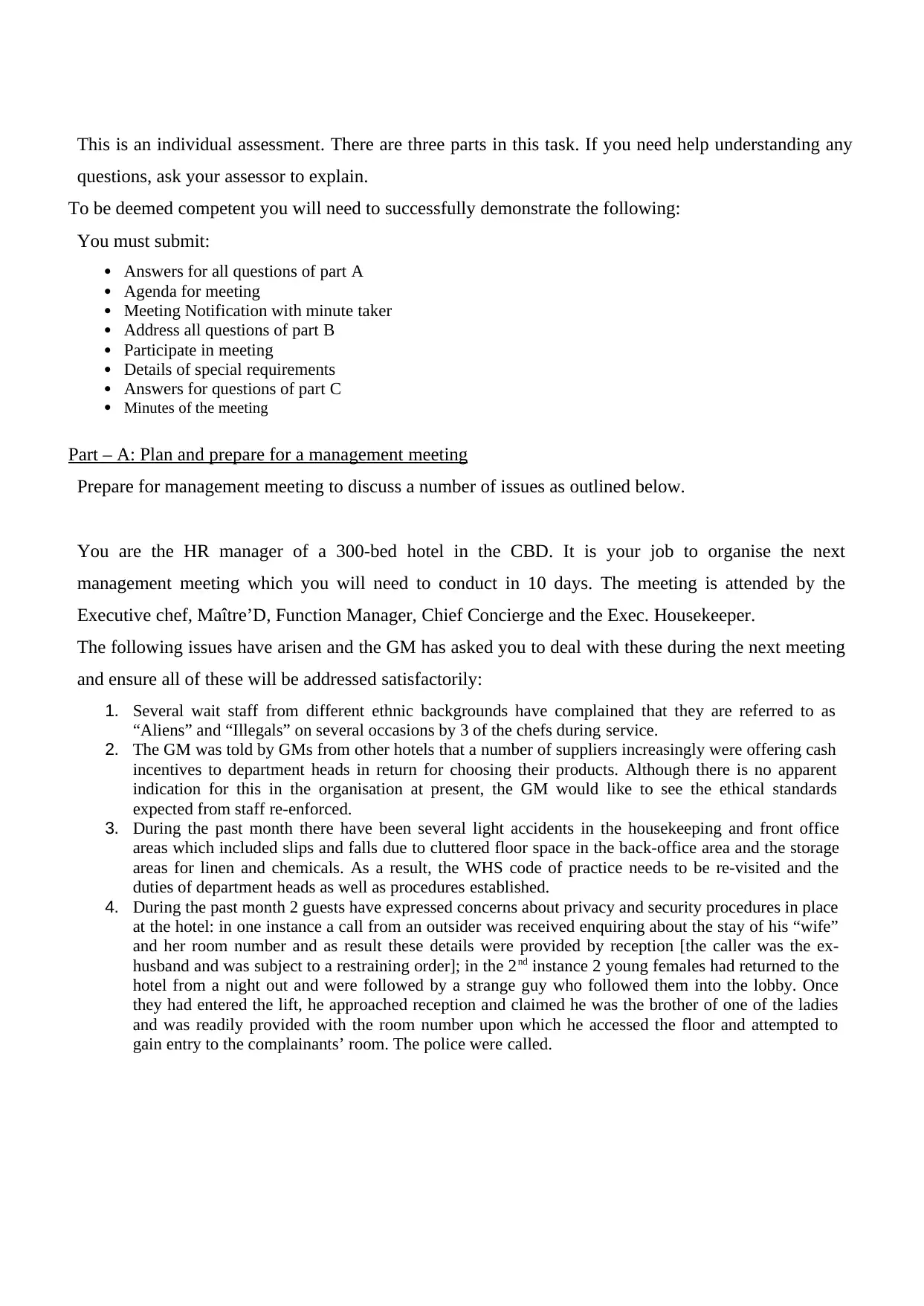
This is an individual assessment. There are three parts in this task. If you need help understanding any
questions, ask your assessor to explain.
To be deemed competent you will need to successfully demonstrate the following:
You must submit:
Answers for all questions of part A
Agenda for meeting
Meeting Notification with minute taker
Address all questions of part B
Participate in meeting
Details of special requirements
Answers for questions of part C
Minutes of the meeting
Part – A: Plan and prepare for a management meeting
Prepare for management meeting to discuss a number of issues as outlined below.
You are the HR manager of a 300-bed hotel in the CBD. It is your job to organise the next
management meeting which you will need to conduct in 10 days. The meeting is attended by the
Executive chef, Maître’D, Function Manager, Chief Concierge and the Exec. Housekeeper.
The following issues have arisen and the GM has asked you to deal with these during the next meeting
and ensure all of these will be addressed satisfactorily:
1. Several wait staff from different ethnic backgrounds have complained that they are referred to as
“Aliens” and “Illegals” on several occasions by 3 of the chefs during service.
2. The GM was told by GMs from other hotels that a number of suppliers increasingly were offering cash
incentives to department heads in return for choosing their products. Although there is no apparent
indication for this in the organisation at present, the GM would like to see the ethical standards
expected from staff re-enforced.
3. During the past month there have been several light accidents in the housekeeping and front office
areas which included slips and falls due to cluttered floor space in the back-office area and the storage
areas for linen and chemicals. As a result, the WHS code of practice needs to be re-visited and the
duties of department heads as well as procedures established.
4. During the past month 2 guests have expressed concerns about privacy and security procedures in place
at the hotel: in one instance a call from an outsider was received enquiring about the stay of his “wife”
and her room number and as result these details were provided by reception [the caller was the ex-
husband and was subject to a restraining order]; in the 2nd instance 2 young females had returned to the
hotel from a night out and were followed by a strange guy who followed them into the lobby. Once
they had entered the lift, he approached reception and claimed he was the brother of one of the ladies
and was readily provided with the room number upon which he accessed the floor and attempted to
gain entry to the complainants’ room. The police were called.
questions, ask your assessor to explain.
To be deemed competent you will need to successfully demonstrate the following:
You must submit:
Answers for all questions of part A
Agenda for meeting
Meeting Notification with minute taker
Address all questions of part B
Participate in meeting
Details of special requirements
Answers for questions of part C
Minutes of the meeting
Part – A: Plan and prepare for a management meeting
Prepare for management meeting to discuss a number of issues as outlined below.
You are the HR manager of a 300-bed hotel in the CBD. It is your job to organise the next
management meeting which you will need to conduct in 10 days. The meeting is attended by the
Executive chef, Maître’D, Function Manager, Chief Concierge and the Exec. Housekeeper.
The following issues have arisen and the GM has asked you to deal with these during the next meeting
and ensure all of these will be addressed satisfactorily:
1. Several wait staff from different ethnic backgrounds have complained that they are referred to as
“Aliens” and “Illegals” on several occasions by 3 of the chefs during service.
2. The GM was told by GMs from other hotels that a number of suppliers increasingly were offering cash
incentives to department heads in return for choosing their products. Although there is no apparent
indication for this in the organisation at present, the GM would like to see the ethical standards
expected from staff re-enforced.
3. During the past month there have been several light accidents in the housekeeping and front office
areas which included slips and falls due to cluttered floor space in the back-office area and the storage
areas for linen and chemicals. As a result, the WHS code of practice needs to be re-visited and the
duties of department heads as well as procedures established.
4. During the past month 2 guests have expressed concerns about privacy and security procedures in place
at the hotel: in one instance a call from an outsider was received enquiring about the stay of his “wife”
and her room number and as result these details were provided by reception [the caller was the ex-
husband and was subject to a restraining order]; in the 2nd instance 2 young females had returned to the
hotel from a night out and were followed by a strange guy who followed them into the lobby. Once
they had entered the lift, he approached reception and claimed he was the brother of one of the ladies
and was readily provided with the room number upon which he accessed the floor and attempted to
gain entry to the complainants’ room. The police were called.
⊘ This is a preview!⊘
Do you want full access?
Subscribe today to unlock all pages.

Trusted by 1+ million students worldwide
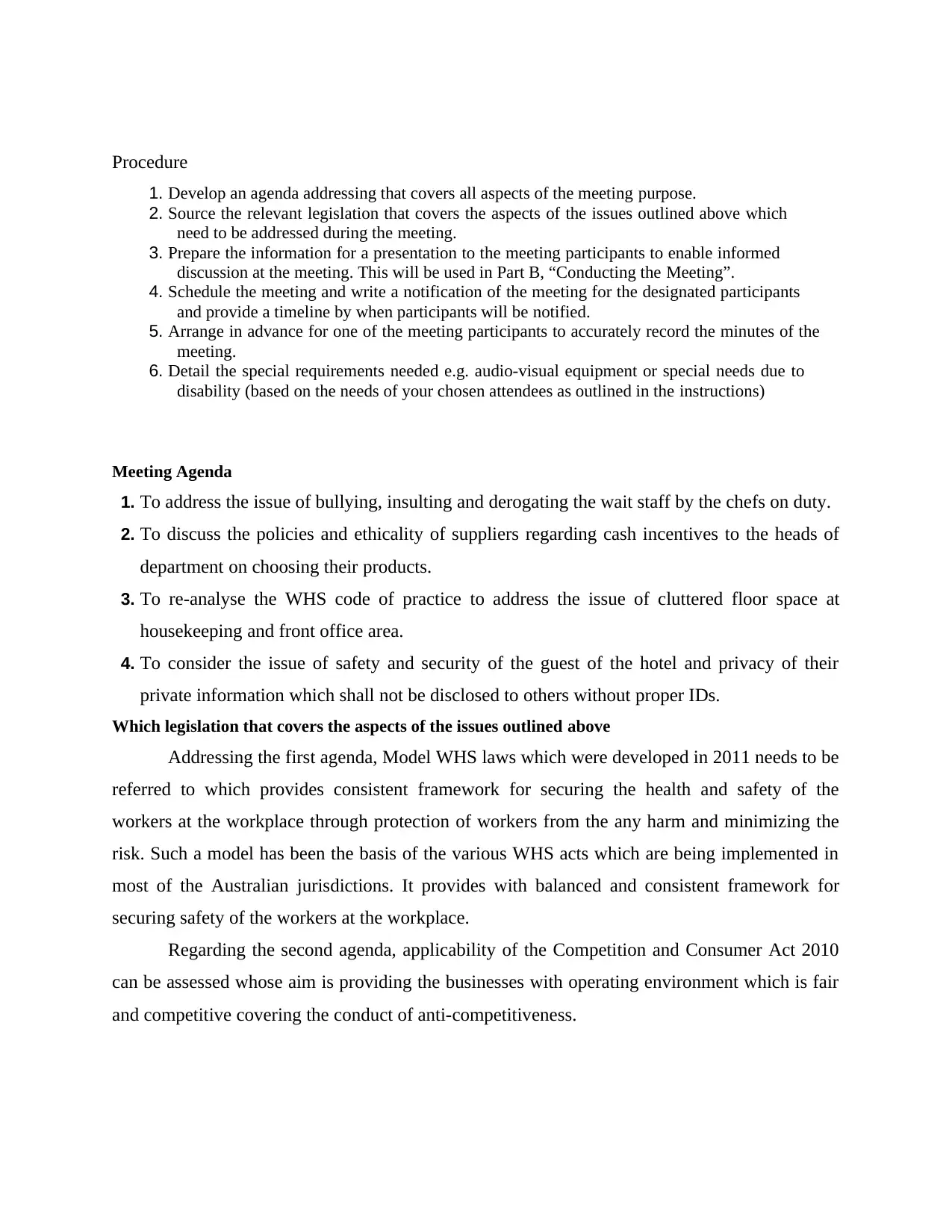
Procedure
1. Develop an agenda addressing that covers all aspects of the meeting purpose.
2. Source the relevant legislation that covers the aspects of the issues outlined above which
need to be addressed during the meeting.
3. Prepare the information for a presentation to the meeting participants to enable informed
discussion at the meeting. This will be used in Part B, “Conducting the Meeting”.
4. Schedule the meeting and write a notification of the meeting for the designated participants
and provide a timeline by when participants will be notified.
5. Arrange in advance for one of the meeting participants to accurately record the minutes of the
meeting.
6. Detail the special requirements needed e.g. audio-visual equipment or special needs due to
disability (based on the needs of your chosen attendees as outlined in the instructions)
Meeting Agenda
1. To address the issue of bullying, insulting and derogating the wait staff by the chefs on duty.
2. To discuss the policies and ethicality of suppliers regarding cash incentives to the heads of
department on choosing their products.
3. To re-analyse the WHS code of practice to address the issue of cluttered floor space at
housekeeping and front office area.
4. To consider the issue of safety and security of the guest of the hotel and privacy of their
private information which shall not be disclosed to others without proper IDs.
Which legislation that covers the aspects of the issues outlined above
Addressing the first agenda, Model WHS laws which were developed in 2011 needs to be
referred to which provides consistent framework for securing the health and safety of the
workers at the workplace through protection of workers from the any harm and minimizing the
risk. Such a model has been the basis of the various WHS acts which are being implemented in
most of the Australian jurisdictions. It provides with balanced and consistent framework for
securing safety of the workers at the workplace.
Regarding the second agenda, applicability of the Competition and Consumer Act 2010
can be assessed whose aim is providing the businesses with operating environment which is fair
and competitive covering the conduct of anti-competitiveness.
1. Develop an agenda addressing that covers all aspects of the meeting purpose.
2. Source the relevant legislation that covers the aspects of the issues outlined above which
need to be addressed during the meeting.
3. Prepare the information for a presentation to the meeting participants to enable informed
discussion at the meeting. This will be used in Part B, “Conducting the Meeting”.
4. Schedule the meeting and write a notification of the meeting for the designated participants
and provide a timeline by when participants will be notified.
5. Arrange in advance for one of the meeting participants to accurately record the minutes of the
meeting.
6. Detail the special requirements needed e.g. audio-visual equipment or special needs due to
disability (based on the needs of your chosen attendees as outlined in the instructions)
Meeting Agenda
1. To address the issue of bullying, insulting and derogating the wait staff by the chefs on duty.
2. To discuss the policies and ethicality of suppliers regarding cash incentives to the heads of
department on choosing their products.
3. To re-analyse the WHS code of practice to address the issue of cluttered floor space at
housekeeping and front office area.
4. To consider the issue of safety and security of the guest of the hotel and privacy of their
private information which shall not be disclosed to others without proper IDs.
Which legislation that covers the aspects of the issues outlined above
Addressing the first agenda, Model WHS laws which were developed in 2011 needs to be
referred to which provides consistent framework for securing the health and safety of the
workers at the workplace through protection of workers from the any harm and minimizing the
risk. Such a model has been the basis of the various WHS acts which are being implemented in
most of the Australian jurisdictions. It provides with balanced and consistent framework for
securing safety of the workers at the workplace.
Regarding the second agenda, applicability of the Competition and Consumer Act 2010
can be assessed whose aim is providing the businesses with operating environment which is fair
and competitive covering the conduct of anti-competitiveness.
Paraphrase This Document
Need a fresh take? Get an instant paraphrase of this document with our AI Paraphraser
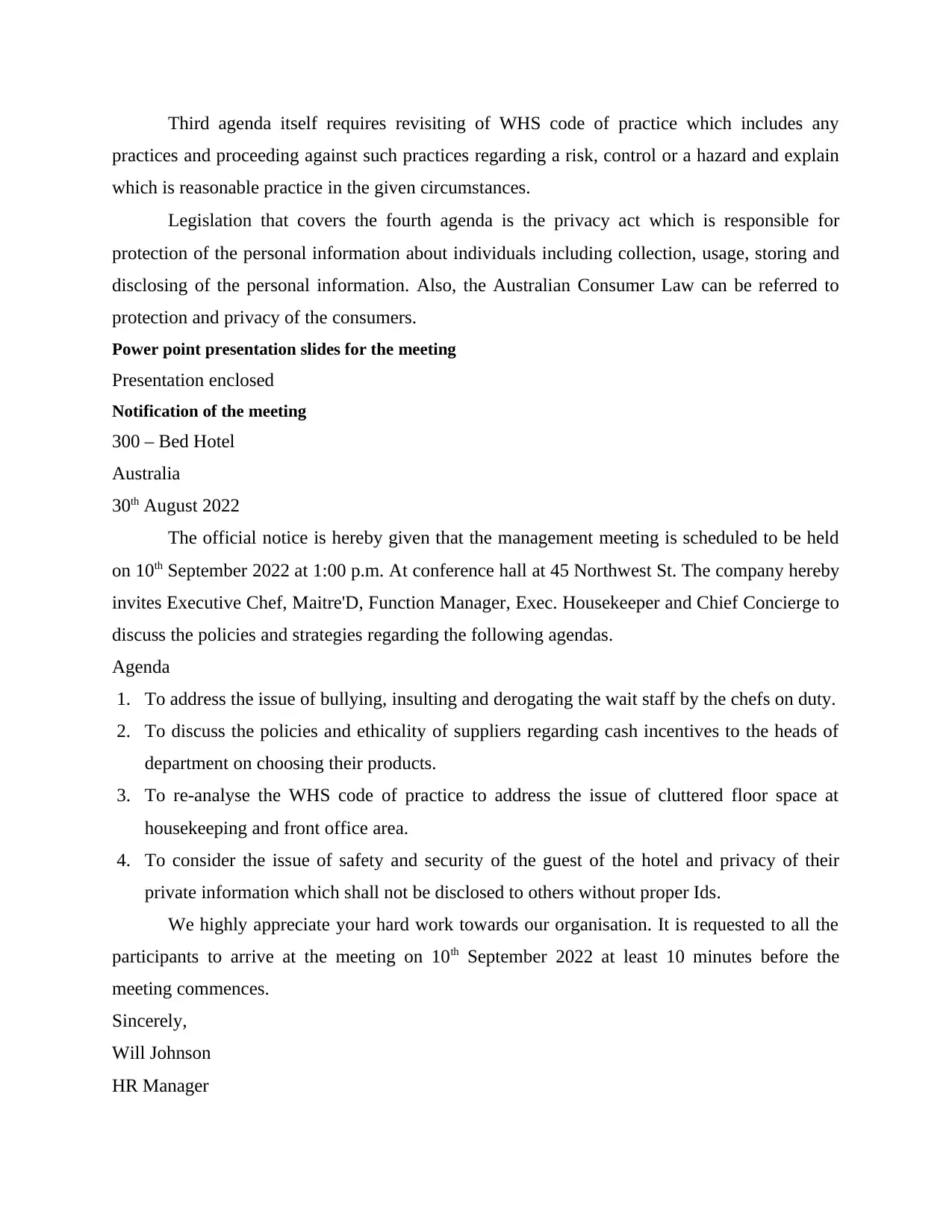
Third agenda itself requires revisiting of WHS code of practice which includes any
practices and proceeding against such practices regarding a risk, control or a hazard and explain
which is reasonable practice in the given circumstances.
Legislation that covers the fourth agenda is the privacy act which is responsible for
protection of the personal information about individuals including collection, usage, storing and
disclosing of the personal information. Also, the Australian Consumer Law can be referred to
protection and privacy of the consumers.
Power point presentation slides for the meeting
Presentation enclosed
Notification of the meeting
300 – Bed Hotel
Australia
30th August 2022
The official notice is hereby given that the management meeting is scheduled to be held
on 10th September 2022 at 1:00 p.m. At conference hall at 45 Northwest St. The company hereby
invites Executive Chef, Maitre'D, Function Manager, Exec. Housekeeper and Chief Concierge to
discuss the policies and strategies regarding the following agendas.
Agenda
1. To address the issue of bullying, insulting and derogating the wait staff by the chefs on duty.
2. To discuss the policies and ethicality of suppliers regarding cash incentives to the heads of
department on choosing their products.
3. To re-analyse the WHS code of practice to address the issue of cluttered floor space at
housekeeping and front office area.
4. To consider the issue of safety and security of the guest of the hotel and privacy of their
private information which shall not be disclosed to others without proper Ids.
We highly appreciate your hard work towards our organisation. It is requested to all the
participants to arrive at the meeting on 10th September 2022 at least 10 minutes before the
meeting commences.
Sincerely,
Will Johnson
HR Manager
practices and proceeding against such practices regarding a risk, control or a hazard and explain
which is reasonable practice in the given circumstances.
Legislation that covers the fourth agenda is the privacy act which is responsible for
protection of the personal information about individuals including collection, usage, storing and
disclosing of the personal information. Also, the Australian Consumer Law can be referred to
protection and privacy of the consumers.
Power point presentation slides for the meeting
Presentation enclosed
Notification of the meeting
300 – Bed Hotel
Australia
30th August 2022
The official notice is hereby given that the management meeting is scheduled to be held
on 10th September 2022 at 1:00 p.m. At conference hall at 45 Northwest St. The company hereby
invites Executive Chef, Maitre'D, Function Manager, Exec. Housekeeper and Chief Concierge to
discuss the policies and strategies regarding the following agendas.
Agenda
1. To address the issue of bullying, insulting and derogating the wait staff by the chefs on duty.
2. To discuss the policies and ethicality of suppliers regarding cash incentives to the heads of
department on choosing their products.
3. To re-analyse the WHS code of practice to address the issue of cluttered floor space at
housekeeping and front office area.
4. To consider the issue of safety and security of the guest of the hotel and privacy of their
private information which shall not be disclosed to others without proper Ids.
We highly appreciate your hard work towards our organisation. It is requested to all the
participants to arrive at the meeting on 10th September 2022 at least 10 minutes before the
meeting commences.
Sincerely,
Will Johnson
HR Manager
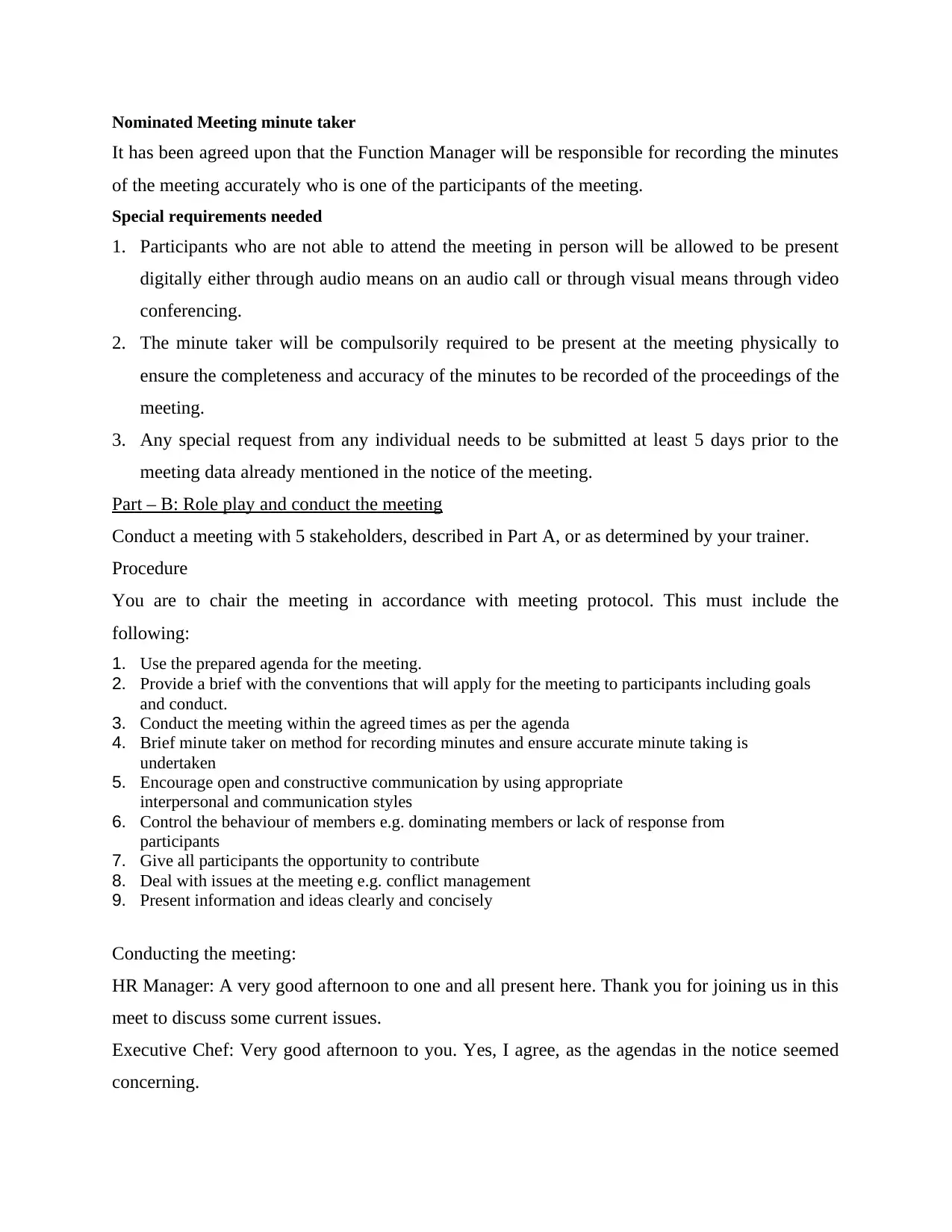
Nominated Meeting minute taker
It has been agreed upon that the Function Manager will be responsible for recording the minutes
of the meeting accurately who is one of the participants of the meeting.
Special requirements needed
1. Participants who are not able to attend the meeting in person will be allowed to be present
digitally either through audio means on an audio call or through visual means through video
conferencing.
2. The minute taker will be compulsorily required to be present at the meeting physically to
ensure the completeness and accuracy of the minutes to be recorded of the proceedings of the
meeting.
3. Any special request from any individual needs to be submitted at least 5 days prior to the
meeting data already mentioned in the notice of the meeting.
Part – B: Role play and conduct the meeting
Conduct a meeting with 5 stakeholders, described in Part A, or as determined by your trainer.
Procedure
You are to chair the meeting in accordance with meeting protocol. This must include the
following:
1. Use the prepared agenda for the meeting.
2. Provide a brief with the conventions that will apply for the meeting to participants including goals
and conduct.
3. Conduct the meeting within the agreed times as per the agenda
4. Brief minute taker on method for recording minutes and ensure accurate minute taking is
undertaken
5. Encourage open and constructive communication by using appropriate
interpersonal and communication styles
6. Control the behaviour of members e.g. dominating members or lack of response from
participants
7. Give all participants the opportunity to contribute
8. Deal with issues at the meeting e.g. conflict management
9. Present information and ideas clearly and concisely
Conducting the meeting:
HR Manager: A very good afternoon to one and all present here. Thank you for joining us in this
meet to discuss some current issues.
Executive Chef: Very good afternoon to you. Yes, I agree, as the agendas in the notice seemed
concerning.
It has been agreed upon that the Function Manager will be responsible for recording the minutes
of the meeting accurately who is one of the participants of the meeting.
Special requirements needed
1. Participants who are not able to attend the meeting in person will be allowed to be present
digitally either through audio means on an audio call or through visual means through video
conferencing.
2. The minute taker will be compulsorily required to be present at the meeting physically to
ensure the completeness and accuracy of the minutes to be recorded of the proceedings of the
meeting.
3. Any special request from any individual needs to be submitted at least 5 days prior to the
meeting data already mentioned in the notice of the meeting.
Part – B: Role play and conduct the meeting
Conduct a meeting with 5 stakeholders, described in Part A, or as determined by your trainer.
Procedure
You are to chair the meeting in accordance with meeting protocol. This must include the
following:
1. Use the prepared agenda for the meeting.
2. Provide a brief with the conventions that will apply for the meeting to participants including goals
and conduct.
3. Conduct the meeting within the agreed times as per the agenda
4. Brief minute taker on method for recording minutes and ensure accurate minute taking is
undertaken
5. Encourage open and constructive communication by using appropriate
interpersonal and communication styles
6. Control the behaviour of members e.g. dominating members or lack of response from
participants
7. Give all participants the opportunity to contribute
8. Deal with issues at the meeting e.g. conflict management
9. Present information and ideas clearly and concisely
Conducting the meeting:
HR Manager: A very good afternoon to one and all present here. Thank you for joining us in this
meet to discuss some current issues.
Executive Chef: Very good afternoon to you. Yes, I agree, as the agendas in the notice seemed
concerning.
⊘ This is a preview!⊘
Do you want full access?
Subscribe today to unlock all pages.

Trusted by 1+ million students worldwide
1 out of 17
Related Documents
Your All-in-One AI-Powered Toolkit for Academic Success.
+13062052269
info@desklib.com
Available 24*7 on WhatsApp / Email
![[object Object]](/_next/static/media/star-bottom.7253800d.svg)
Unlock your academic potential
Copyright © 2020–2026 A2Z Services. All Rights Reserved. Developed and managed by ZUCOL.





